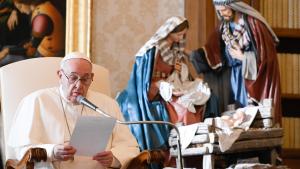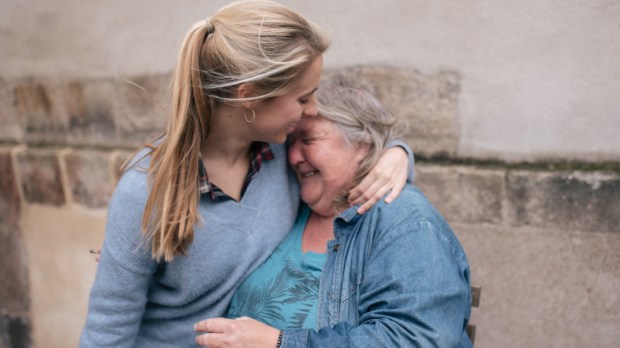Pope Francis says that Mary’s example in responding to the Angel Gabriel is an invitation to stop procrastinating. “She could have asked for a little time to think about it, or even for more explanations about what would happen; perhaps she could have set some conditions… Instead, she does not take time, she does not keep God waiting, she does not delay.”
The Holy Father reflected on Mary’s response to God in his address before praying the midday Angelus on December 20. The Angelus, in fact, is the prayer the Church invites us to pray three times a day to contemplate precisely the moment of Mary’s yes.
The pope warned against procrastinating:
Today, on the threshold of Christmas, Mary invites us not to postpone, but to say “yes.” “Must I pray!” “Yes, I will seek and pray.” “Must I help others? Yes.” How shall I do it? And I do it. Without putting it off. Every “yes” costs something, every “yes” has its cost, but it always costs less than what that courageous and prompt “yes” cost her, that “let it be to me according to your word,” which brought us salvation.
The pope had explained that Our Lady’s yes implied great personal cost. Though Gabriel was proposing to her what was surely the dream of every woman of the time, to be the mother of the Messiah, she was as yet unmarried; the law prescribed stoning for unmarried women found pregnant.
Certainly the divine message would have filled Mary’s heart with light and strength; nevertheless, she found herself faced with a crucial decision: to say “yes” to God, risking everything, even her life, or to decline the invitation and to continue her ordinary life.
Mary’s response, though, is a yes that “in the language in which the Gospel is written, it is not simply ‘let it be,'” Francis said. “The expression indicates a strong desire, it indicates the will that something happen. In other words, Mary does not say: If it has to happen, let it happen…, if it cannot be otherwise….’ It is not resignation. No, she does not express a weak and submissive acceptance, but rather she expresses a strong desire, a vivacious desire.
“She is not passive, but active. She does not submit to God, she binds herself to God. She is a woman in love prepared to serve her Lord completely and immediately.”
Mary thus invites us with her example to change how we live.
How often – let us think of ourselves now – how often is our life made up of postponements, even the spiritual life! For example, I know it is good for me to pray, but today I do not have time… tomorrow… by saying “tomorrow, tomorrow, tomorrow,” we postpone things: I will do it tomorrow. I know it is important to help someone, yes, I must do it: I will do it tomorrow.
So the Holy Father suggested a practical decision:
Instead of complaining in these difficult times about what the pandemic prevents us from doing, let us do something for someone who has less: not the umpteenth gift for ourselves and our friends, but for a person in need whom no one thinks of! And another piece of advice: in order for Jesus to be born in us, let us prepare our hearts, let us go to pray, let us not let ourselves be swept up by consumerism. “Ah, I have to buy presents, I must do this and that” — that frenzy of doing things, more and more. It is Jesus that is important. Consumerism is not found in the manger in Bethlehem: there is reality, poverty, love. Let us prepare our hearts to be like Mary’s: free from evil, welcoming, ready to receive God. “Let it be to me according to your word.” This is the Virgin’s last word for this last Sunday of Advent, and it is the invitation to take a genuine step towards Christmas. For if the birth of Jesus does not touch our lives – mine, yours, ours, everyone’s – if it does not touch our lives, it slips past us in vain. In the Angelus now, we too will say “let your word be fulfilled in me”: May Our Lady help us to say it with our lives, with our approach to these last days in which to prepare ourselves well for Christmas.

Read more:
Not tomorrow, but right now: A procrastinator’s prayer to the Holy Spirit
A Christmas close to Jesus
After praying the Angelus, Pope Francis reiterated the message, explaining how we can approach a “living Nativity scene.”
May Christmas, now close at hand, be for each of us an occasion of inner renewal, of prayer, of conversion, of steps forward in faith and of fraternity among ourselves. Let us look around us, let us look especially at those who are in need: the brother who suffers, wherever he may be, is one of us. He is Jesus in the manger: The one who suffers is Jesus. Let us think a little about this. Let Christmas be closeness to Jesus, in this brother and sister. There, in the brother in need, is the Nativity to which we must go in solidarity. This is the living nativity scene: the nativity scene where we truly meet the Redeemer in the people in need. Let us therefore journey towards the holy night and await the fulfilment of the mystery of Salvation.

Read more:
Pope: Christmas with restrictions? Mary and Joseph’s Christmas wasn’t a rose garden

